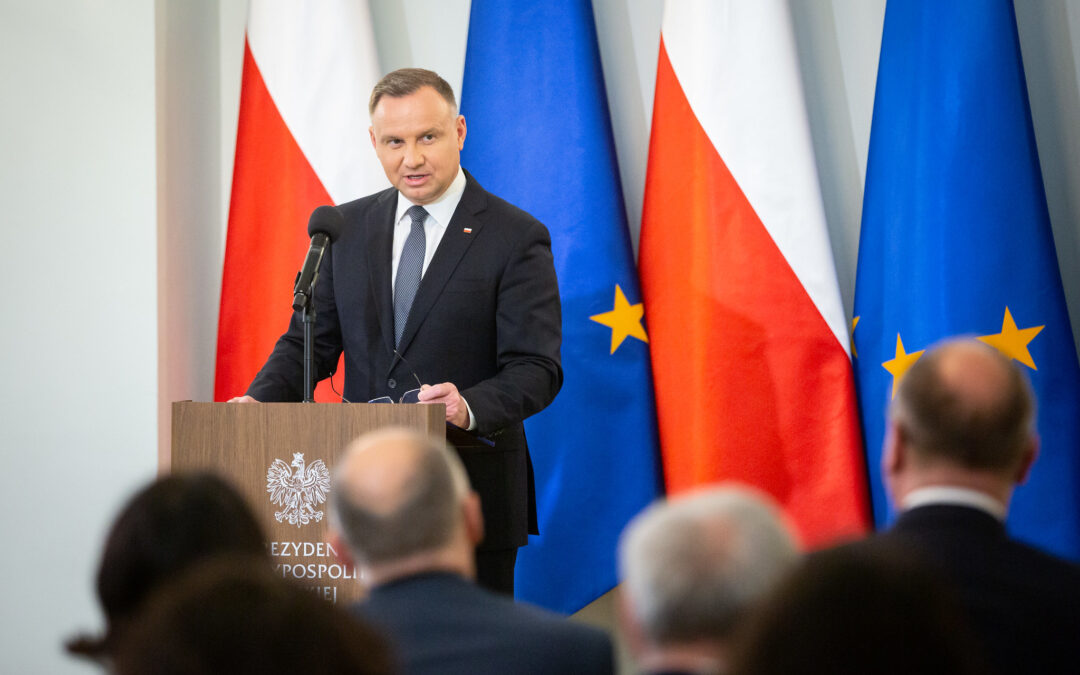Keep our news free from ads and paywalls by making a donation to support our work!

Notes from Poland is run by a small editorial team and is published by an independent, non-profit foundation that is funded through donations from our readers. We cannot do what we do without your support.
Polish President Andrzej Duda has said he has reached an agreement with the government that could end an almost year-long dispute over the appointment of ambassadors.
The clash started last year when the ruling coalition announced plans to replace over 50 ambassadors appointed under the former Law and Justice (PiS) administration. That prompted opposition from PiS-aligned Duda, who is constitutionally responsible for appointing and dismissing ambassadors.
Yesterday, however, Duda said that progress has been made towards resolving the issue, explaining that foreign minister Radosław Sikorski is restoring the “standard procedure” regarding the appointments, according to which the president gives preliminary approval to nominations.
– Jest porozumienie w sprawie nominacji dla kilkudziesięciu nowych polskich ambasadorów – przekazał @AndrzejDuda w "Gościu Wydarzeń". Prezydent mówił, że Pałac Prezydencki współpracuje w tej sprawie z @sikorskiradek.
🎙️@BogRymanowski https://t.co/vcTBd9Nkcp
— PolsatNews.pl (@PolsatNewsPL) February 24, 2025
During an interview with broadcaster Polsat News, Duda was asked whether the current international situation warranted reaching a deal with Prime Minister Donald Tusk on diplomatic appointments.
“There is an agreement,” replied Duda. “The foreign minister is restoring the standard procedure, which starts with the initial approval of the nominee by the president.”
He added that he was prepared to proceed with ambassadorial nominations. “Because it is not about blocking them, it is about not violating the constitutional prerogatives of the president,” he said.
Duda stressed that pre-approval by the president had previously been a crucial step in appointing ambassadors. He accused Tusk’s government, particularly “the part under Sikorski’s administration”, of attempting to “nullify” this prerogative.
Duda warned that if his consent was only obtained later in the nomination process, the presidential prerogative would lose its significance as it would “put the president against the wall”.
He noted that the foreign minister was aware of his reservations regarding certain candidates but said he was willing to sign off on most nominations.
“As soon as the completed documents arrive [at the presidential palace], we will proceed,” Duda said, confirming that he is cooperating with Sikorski on the appointments. “The government has simply returned to the normal, fair and dependable procedure that has always been followed,” Duda added.
Sikorski has not yet commented on Duda’s remarks.
Poland’s government has announced plans to remove over 50 ambassadors appointed under the former PiS administration
That has prompted a negative response from PiS-aligned President Andrzej Duda, who is responsible for appointing and dismissing ambassadors https://t.co/7GDISqXn0H
— Notes from Poland 🇵🇱 (@notesfrompoland) March 14, 2024
The dispute between the foreign ministry and the president over ambassadorial appointments began in March 2024, when Sikorski decided to end the missions of more than 50 ambassadors and withdraw several nominations put forward by the former ministry leadership under PiS.
However, Duda refused to nominate successors for the recalled ambassadors, stating that “no Polish ambassador can be appointed or dismissed without the president’s signature”. Sikorski defended the ministry’s decision, arguing that ambassadors represent the government, not the state.
As a result of the president’s opposition, however, the new diplomats appointed by the foreign ministry took over embassies only in an acting capacity, without formal ambassadorial status.
This is the case in the United States, where Bogdan Klich replaced Marek Magierowski, Duda’s former spokesman, who had served as ambassador in Washington since 2021, and in Ukraine, where Piotr Łukasiewicz took over from Jarosław Guzy.
Poland’s government has named a new head of the Polish embassy in the US.
However, he will not formally be an ambassador because the president, an ally of the opposition, refuses to sign off on his appointment https://t.co/yj7vS3n4xc
— Notes from Poland 🇵🇱 (@notesfrompoland) July 14, 2024

Notes from Poland is run by a small editorial team and published by an independent, non-profit foundation that is funded through donations from our readers. We cannot do what we do without your support.
Main image credit: Ministry of Foreign Affairs of the Republic of Poland / flickr.com (under CC BY-NC 2.0)

Alicja Ptak is deputy editor-in-chief of Notes from Poland and a multimedia journalist. She has written for Clean Energy Wire and The Times, and she hosts her own podcast, The Warsaw Wire, on Poland’s economy and energy sector. She previously worked for Reuters.



















